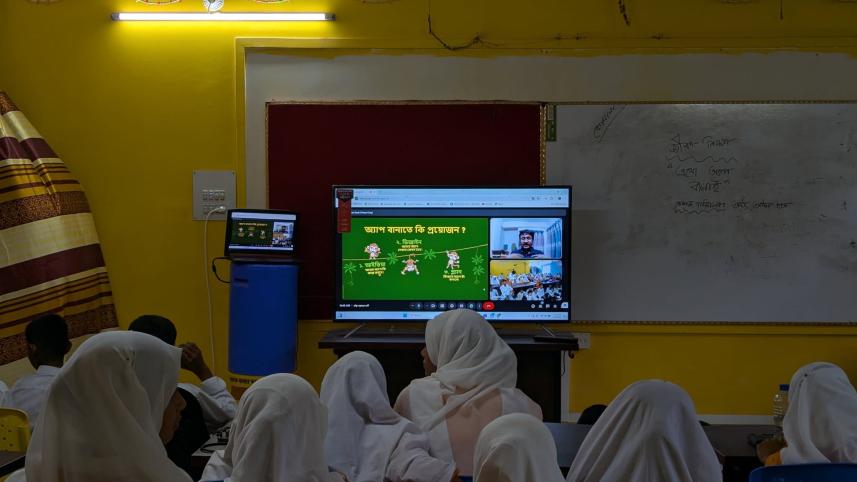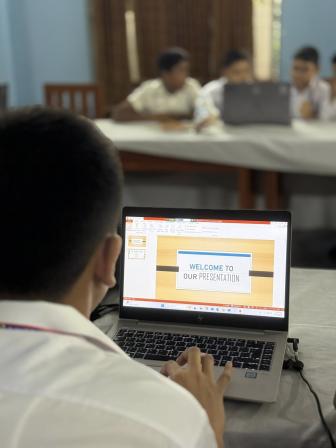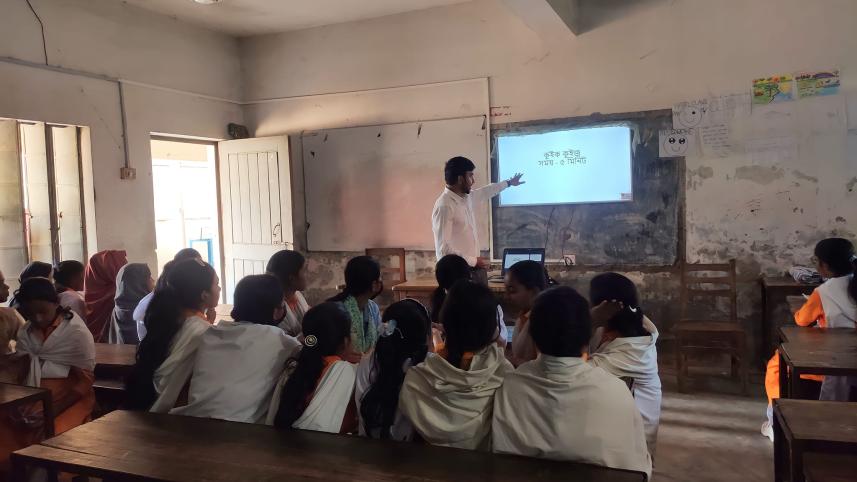TFB and ISOC partner up to bridge the digital divide

The Internet Society Foundation (ISOC) has been instrumental in transforming how underserved children, parents, and teachers access digital learning across low-resource communities in Bangladesh.
What began in 2020 as an emergency response to school closures during Covid-19 (the Empowering Students for Online Learning (ESOL) project) has since evolved into the Bridging Online Learning Divide (BOLD) initiative, which is now the BRIDGE (Beyond Reach – Internet Drive for Growth and Empowerment) project. This ambitious programme combines digital skills training, parent engagement, and direct internet support to students. Together, these initiatives have touched the lives of tens of thousands and set a new standard for digital and distance learning in Bangladesh.
From crisis response to long-term change
The ESOL project launched in late 2020, when Bangladesh experienced one of the world's longest school closures. With ISOC'S support, Teach For Bangladesh, brought internet-based learning to 1,847 marginalised students—exceeding its initial target of 1,000 students, many of whom had never experienced blended learning. By the end of the project, 93 percent fellows reported confidence in blended learning after receiving intensive training, and 70 percent students said they wanted to continue with blended learning even after schools reopened.
Parents, too, were integral to this project. More than 1,000 parents received digital literacy and online safety training, learning not only how to support their children's schooling but also how to use the internet for everyday needs. As one parent put it: "Online-based learning initiatives have helped my child during the closings, and I want to stay more involved in her online education."

Scaling up with BOLD
Building on this foundation, the BOLD project was launched in 2022 to strengthen the intervention in a broader way. The goal was to reach over 5,000 underserved children in Dhaka and Chattogram with blended and distance learning opportunities.
The results have been striking:
Around 5,086 students participated in blended learning activities, gaining confidence in using the internet for schoolwork.
At least 209 teachers (TFB fellows) were trained in flipped classroom and blended learning methods, with 91 percent reporting increased confidence in digital pedagogy.
Meanwhile, 2,641 parents engaged actively in parent-teacher meetings, where teachers and parents collaboratively strengthened the home–school connection for digital learning and 1,247 students received internet stipends each month, ensuring financial barriers did not prevent access to online education.
Even during crises such as the July uprising and devastating flash floods in 2024, ISOC'S emergency support enabled TFB to extend internet stipends to 385 students in Cox's Bazar, keeping their education uninterrupted.

The next phase: BRIDGE
Jenn Beard, senior programme officer, Internet Society Foundation, said, "It has been a pleasure supporting the work of Teach For Bangladesh since 2020 when our initial grant enabled students to stay in school via remote learning. Since then, we've seen TFB's work blossom into deeply integrating the Internet and digital tools and skills in their lesson planning, teaching plans, and in students' day-to-day learning -- setting up the futures of thousands of young people to make positive impacts across the country."
The intervention has now entered its third phase. The focus is now not only on access but also on safe, ethical, and responsible digital learning. The project will equip students across Dhaka, Chattogram, Rangpur, and Cox's Bazar with critical digital literacy skills, enhance teachers' capacity with advanced digital tools, and empower parents to become active guides in their children's online education.
Under BRIDGE, TFB has provided hands-on training on different tools of digital literacy and internet safety for 3,240 parents; 1,247 students received internet stipends each month, enabling uninterrupted access to learning on digital platforms.
Inside the classroom: Voices of change
Beyond the numbers lie stories of resilience and possibility. In classrooms, teachers are sparking a love for learning by using digital tools in creative ways -- from sharing comic books online to making lessons more interactive. For many students, especially those with additional needs, online classes have opened doors to more consistent participation, confidence, and new dreams.
Head Teacher Osim Kumar Debnath reflected, "Through blended learning, fellows are conducting online classes and staying connected with students via WhatsApp groups. When materials are shared in advance, students come prepared, and during holidays or closures, worksheets and online lessons add an entirely new dimension to their studies."
One student added, "Whenever we struggle with lessons, our teacher patiently explains again and even arranges extra online sessions. Sometimes she records the lessons so we can learn at our own pace. Before exams or during holidays, these online classes help us continue without interruption."
The partnership between TFB and ISOC demonstrates how international philanthropy and local innovation can converge to address inequities—from training parents and teachers to providing internet access for students -- creating a digital learning ecosystem in communities where access was once unthinkable.
In a country where floods, political unrest, and poverty frequently disrupt education, the TFB–ISOC partnership has shown that the internet is not merely a lifeline for learning; it is enabling students to become resilient, self-learners capable of continuing their education beyond the classroom



 For all latest news, follow The Daily Star's Google News channel.
For all latest news, follow The Daily Star's Google News channel.
Comments